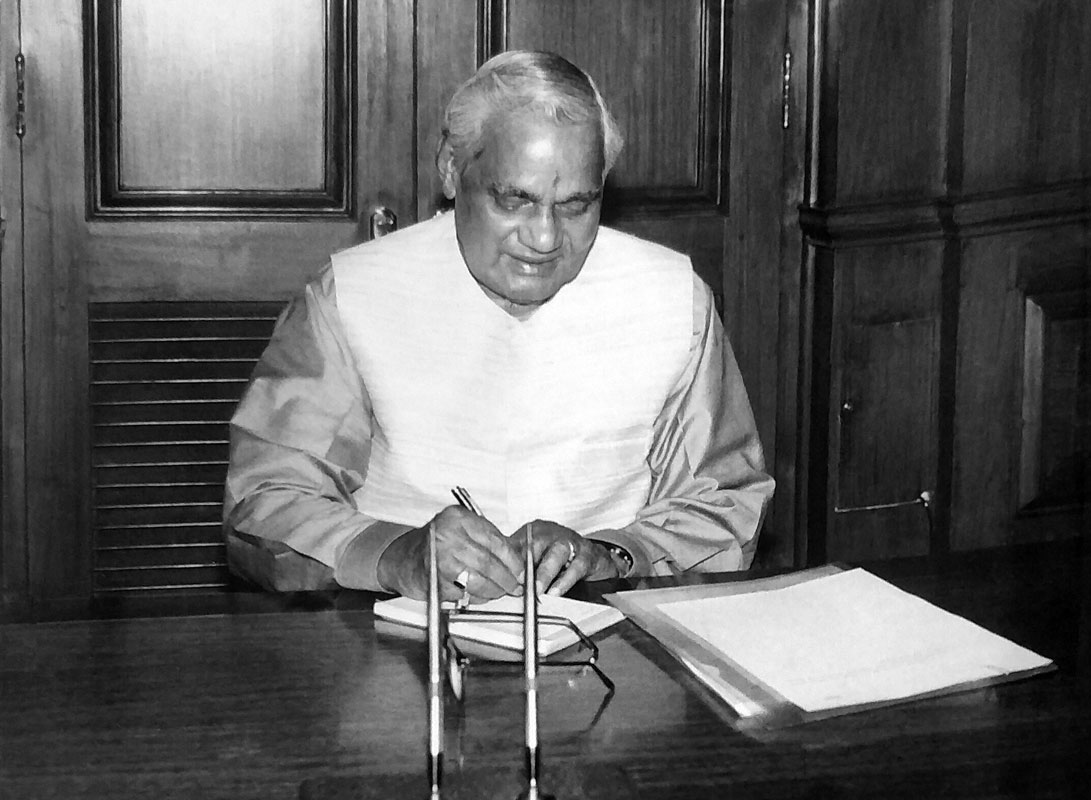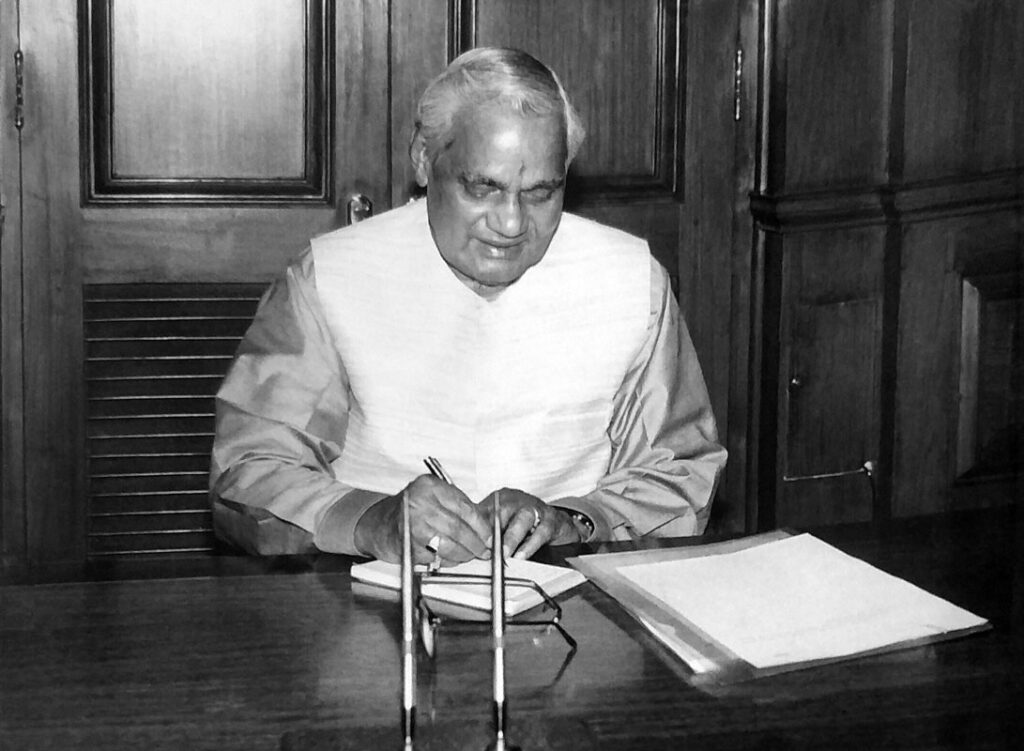When former Prime Minister A B Vajpayee passed away in August 2018, there was a spontaneous outpouring of grief. Even from those who are opposed to the BJP and its ideology, because by and large Vajpayee was considered a man of moderation. There was nostalgia for Vajpayee’s moderation and his ability to keep the ‘extremists’ on his side of the ideological fence under control.”

But this “nostalgia was misleading”, says Shakti Sinha in his latest book, a biography of the late prime minister titled Vajpayee: The years that changed India. He argues that during all his years in and out of power, he was constantly criticised by several sections on various counts.
The closeness of Sinha, an IAS officer, who had spent long years as Vajpayee’s private secretary, when he was in power, and chose to stay with him, even when he wasn’t, is well-known in political and bureaucratic circles. Much has been written about Vajpayee, and yet Sinha’s book has to be read, especially for those who, despite being on the opposite side of the political fence, admired the late leader for his sense of fairness and justice and considered him a “dove among hawks” in the Sangh Parivar.
Sinha’s account takes us back to an era where political opponents were not considered devils or untouchables. He recalls that as a Jana Sangh MP in the Lok Sabha 1957, Vajpayee’s first speech was on foreign policy, which remained his favourite subject. Prime Minister Jawahar Lal Nehru, who had retained the foreign affairs portfolio, took great care to address each of the points raised by Vajpayee. “Even as Vajpayee was critical of Nehru’s policies, he seemed overawed by the latter. After Nehru’s death, Vajpayee’s eloquent eulogy in the Rajya Sabha (as MP there), was that of an admirer,” says the book.
Even in 1994, at the request of then PM Narasimha Rao, it was Vajpayee who led the Indian delegation to the UN and successfully countered Pakistan’s putting the Kashmir issue on the UN Human Rights agenda.
As any biography of Vajpayee is expected to do, the book does talk about Vajpayee’s terms in office as prime minister, the first one in March 1998, the fall of his government in 13 months, and his subsequent return as prime minister later in 1999, to complete a full term in government. All the required datelines and events are there, but the book is made more interesting by Sinha’s long association with his boss. For instance, he tells us that Vajpayee was by nature “a shy person, not at all a backslapping sort and slow to open up.” He had no godfather in politics, had risen to the topmost level by sheer merit and was “strangely very conscious of his limitations, and it was this that made him very successful.”
A lot is written about his great oratorial skills; the author tells us how “people never understood how observant he was, how conscious of using the correct word at critical times and how much effort he could put into things that he found important. His pauses while speaking, were not just for effect but for precision.”
The book also gives us great insight onto the troubled Vajpayee government in 1998, which was jolted all the time by its own allies, principally AIADMK chief J Jayalalithaa, followed by TMC’s Mamata Banerjee. Two carefully chosen pictures — that of an anxious and frowning Vajpayee, seated before a Jayalalithaa perusing some papers, possibly a list of demands — and the next of a totally relaxed PM grinning in a frame with TDP’s Chandrababu Naidu, one of his trusted alliance partners, tell it all!
Jaya’s principal demands were withdrawal of the plethora of corruption cases against her and appointment of Subramaniam Swamy as the finance minister! Mamata kept storming out of NDA coordination committee meetings protesting that West Bengal was being “neglected”, and Jayalalithaa gave him endless pinpricks, constantly bickering about who should be included in the Vajpayee ministry and who should be dropped.
The author says that “one of the tragedies of Vajpayee as prime minister was that he was denied any kind of honeymoon period, either when he took office in March 1998 or after his Lahore visit, which should have been followed by days of basking in the sun.” The reference is of course to the famous bus ride to Lahore that Vajpayee announced in such good faith to improve Indo-Pak ties, and which boomeranged with Pakistan, more the army chief Gen Pervez Musharraf, rather than Prime Minister Nawaz Sharif, responding with the Kargil incursions which brought the two countries on the brink of war.
Earlier, the political drama in Delhi came to a climax with both Sonia Gandhi and Jayalalithaa attending a tea party hosted by Swamy in Delhi on March 29, 1999, famously known as “storm in a tea cup”. Finally, Vajpayee’s government fell by just one vote, and says Sinha: “I had never seen Vajpayee more distraught than when he walked back into his room in the Parliament House after losing the vote of confidence. He was crestfallen and in tears.”
Of course the Congress which ensured that this government fell, could not muster enough numbers to form an alternative government, and Vajpayee was asked to head a caretaker government. Sinha adds that in the run up to the next election, “Vajpayee made it clear that Sonia Gandhi’s foreign origin would not be an issue, nor would the NDA run a personality-based election; he said that it should, instead lay emphasis on the real issues and the achievement of his government.”
The government fell in April, the Kargil incursion happened in May and on the intervention of the then US President Bill Clinton, on July 4, Sharif publicly committed to Clinton that Pakistan would withdraw forces to its side of the LoC. Looking back, it seems incredible that a caretaker government in India, headed by the very mature and astute Vajpayee, deftly handled the Kargil incursions and avoided a disastrous war.
Read this book to learn about the rise of Vajpayee, the qualities of the man that made him the endearing leader that he was and why he is being missed today. Though not a complete biography, it gives the reader an important slice of Vajpayee’s years in politics, what made the man tick, his friends and foes, etc. An important component of this book comprises details about the spearheading of important economic reforms by the late prime minister and how he skilfully manoeuvred the economy to ensure the country did not sink into an economic disaster after the imposition of economic sanctions following the nuclear tests in Pokhran in April 1998.
The man who emerges from these pages is an affable, moderate, articulate, reasonable, and yet a firm and astute leader, who could weave magic with his oratory and charm even his rivals. That he left an indelible mark on India is beautifully captured in this book.
Vajpayee: The years that changed India
Author: Shakti Sinha
Publisher: Penguin
351 pages
Rs. 599







